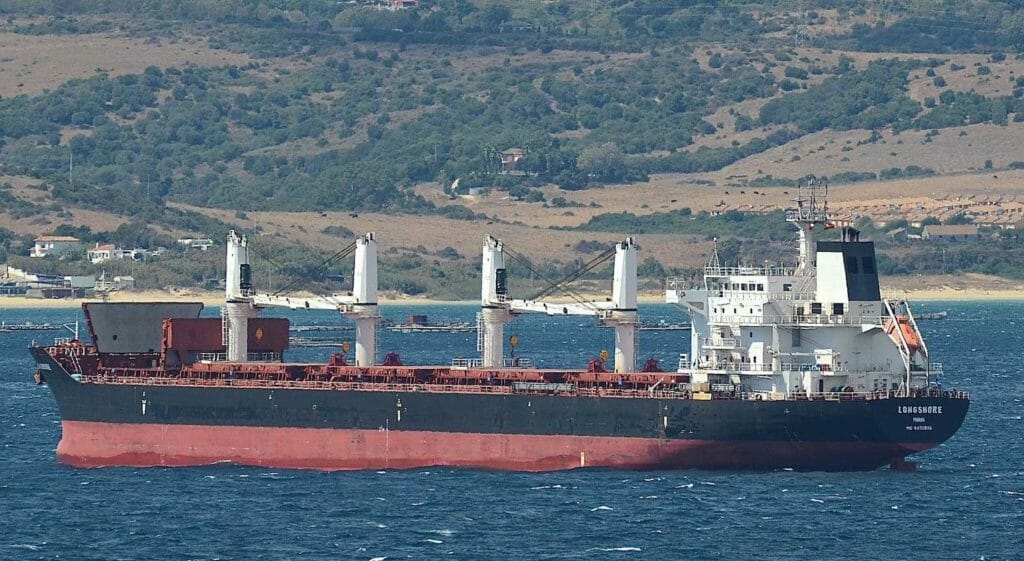Filipino engineer gets a year in jail for illegally dumping oily waste from ship

New Trade and Chief Engineer Dennis Plasabas admitted that oily bilge water was illegally dumped from the Longshore directly into the ocean without the required processing through pollution prevention equipment. US DOJ
SAN DIEGO, California –A cargo ship operating company and the Filipino chief engineer of one of its vessels were sentenced in federal court Sept. 9 for environmental crimes.
New Trade Ship Management S.A. and its Chief Engineer Dennis Plasabas pleaded guilty August 9 to maintaining false and incomplete records on the discharge of oily bilge water from the bulk carrier vessel Longshore.
New Trade must pay a fine of $1.1 million, serve a term of four years of probation during which it must hire an independent monitor to audit environmental compliance. Plasabas was sentenced to a term of 12 months in custody.
New Trade and Plasabas admitted that oily bilge water was illegally dumped from the Longshore directly into the ocean without the required processing through pollution prevention equipment.
Oily bilge water typically contains oil contamination from the operation and cleaning of machinery on the vessel. The defendants also admitted that these illegal discharges were not recorded in the vessel’s Oil Record Book as required by law.
According to court records, between October and December 2021, Plasabas ordered lower-ranking crew members to bypass pollution prevention equipment by transferring oily bilge water from the vessel’s Bilge Holding Tank to the vessel’s Sewage Tank, from where it was discharged directly into the ocean.
These improper transfers and overboard discharges were not recorded on the vessel’s Oil Record Book. Plasabas also directed lower-ranking crew members to pump clean sea water into the vessel’s Bilge Holding Tank in the same quantity as the discharged oily water to create a misleading electronic record as if the pollution prevention equipment had been properly used.
Plasabas then processed the clean sea water through the vessel’s pollution prevention equipment as if it was oily bilge water to make it appear that the pollution prevention equipment was being properly used when in fact it was not. The electronic records indicate that approximately 9,600 gallons of clean sea water were run through the pollution prevention equipment.
“Today’s sentence sends a strong message that environmental crimes will have serious consequences,” said U.S. Attorney Randy Grossman. “Unlawful oil discharges have a serious negative impact on the marine environment. We must safeguard our oceans by vigorous enforcement of environmental laws.” Grossman thanked the prosecution team and the U.S. Coast Guard for their excellent work on this case.
According to sentencing documents, the use or consumption of oil, including the intentional discharge of unfiltered oily bilge water, accounts for around 37 percent of worldwide ocean oil pollution. By contrast, accidental spills from ships account for 12 percent of oil pollution.
Marine mammal and bird species, which must regularly pass through the air-water interface to breathe, are particularly vulnerable to oil exposure.
A 2002 study undertaken in Canada estimated that the intentional discharge of oil from ships kills approximately 300,000 seabirds per year in Atlantic Canada – a yearly seabird mortality equal to that caused by the Exxon Valdez disaster in Alaska in 1989.
This case was investigated by the U.S. Coast Guard Sector San Diego and the U.S. Coast Guard Investigative Service. The case was prosecuted by Assistant U.S. Attorney Melanie K. Pierson for the Southern District of California and Senior Trial Attorney Stephen Da Ponte of ENRD’s Environmental Crimes Section.

